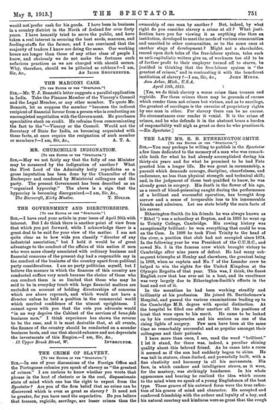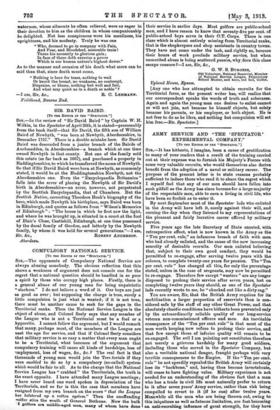THE LATE MR. R. B. ETHERINGTON-SMITH. [To THE EDITOR OF
THE "SPECTATOR."]
SIR,—You may perhaps be willing to publish in the Spectator a few lines dedicated to the memory of a man who was remark- able both for what he had already accomplished during his thirty-six years and for what he promised to be had Fate granted him a longer life. He was great in oarsmanship, a pursuit which demands courage, discipline, cheerfulness, and endurance, no less than physical strength and technical skill; and, in the judgment of those best qualified to know, he was already great in surgery. His death in the flower of his age, as a result of blood-poisoning caught during the performance of a brilliant and successful operation, has brought deep sorrow and a sense of irreparable loss to his innumerable friends and admirers. Let me state briefly the main facts of his career.
Etherington-Smith (to his friends be was always known as " Ethel ") was a schoolboy at Repton, and in 1895 he went up to Trinity College, Cambridge. His rowing history was exceptionally brilliant : he won everything that could be won on the Cam. In 1898 he took First Trinity to the head of the river, a position that club had not occupied since 1874. In the following year he was President of the C.U.B.C., and rowed No. 5 in the famous crew which brought victory to Cambridge after nine years of defeat. He had many sub- sequent triumphs at Henley and elsewhere, the greatest being in 1908, when as captain and No. 7 of the Leander crew he helped to win the eights for the United Kingdom at the Olympic Regatta of that year. This was, I think, the finest English crew that has ever sat in a boat, and its excellence was very largely due to Etherington-Smith's efforts in the boat and out of it.
In the meantime he had been working steadily and brilliantly at his profession. He joined St. Bartholomew's Hospital, and passed the various examinations leading up to the Cambridge M.B. degree with special distinction. At the hospital he filled one after another all the positions of trust that were open to his merit. He came to be looked on by his contemporaries and his seniors as one of the rising lights of surgery. Few men have been at the same time so remarkably successful and so popular amongst their colleagues and their patients.
I have more than once, I see, used the word " I let it stand, for there was, indeed, a peculiar shining quality about this beloved friend. As he came into a room it seemed as if the sun had suddenly begun to shine. He was tall in stature, clean-limbed, and powerfully built, with a fine elasticity and harmony in all his movements. His face, in which candour and intelligence strove, as it were, for the mastery, was strikingly handsome. In his whole appearance and bearing he realized the idea which comes to the mind when we speak of a young Englishmen of the best type. These graces of his outward form were the true reflec- tion of his graces of mind and character. He accepted and conferred friendship with the ardour and loyalty of a boy, and his natural courtesy and kindness were so great that the rough watertuen, whose ailments he often relieved, were as eager in their devotion to him as the children in whose companionship be delighted. Not less conspicuous were his manliness, his uprightness, and his modesty. Truly he was one
" Who, doomed to go in company with Pain, And Fear, and Bloodshed, miserable train! Turns his necessity to glorious gain; In face of these cloth exercise a power Which is our human nature's highest dower."
As to the manner and occasion of his death what more can be said than that, since death must come,
" Nothing is here for tears, nothing to wail Or knock' the breast, no weakness, no contempt, Dispraise, or blame, nothing but well and fair, And what may quiet us in a death so noble"?
Keldhead, Bourne End.



















































 Previous page
Previous page